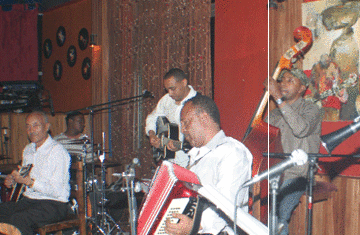
Addis Fortune
A Thursday night at Club Alize represents Addis Abeba’s successful, prosperous side. Classy and civilized, with lights dimmed and maroon drapes floating overhead, the atmosphere is completed, rather than created, by the elegant live music.
A long L-shaped bar takes up one side of the room with booths on the opposite side, two of them featuring large murals by noted Ethiopian artist, Daniel Taye. Art is a theme at Alize, with paintings by other well-known artists Tibebe Terffa, Behailu Bezabih and Dawit Abebe serving as further decoration.
But the attractive interior is not why the club is standing room only most Thursday nights. Instead, the seven strong group playing the fusion of pop, jazz and folk music is very much the focus of the well-heeled audience’s attention.
The Addis Acoustic Renaissance Group is led by Girum Mezmur on guitar and is made up of Henock Temesgen on double bass; Natnael Tessema on drums; Ayele Mamo playing the Mandolin, as he has done for the last 50 years; Shaleka Melaku Tegegn on accordion; clarinet player Dawit Ferew; and another percussionist, Mesale Legesse.
The group’s reinventions of Ethiopian songs from the fifties and sixties by artists such as Buzenesh Bekele are short and melodious, with the different components complementing each other and never competing for centre song. A rustic, folksy edge is added to the performance by the presence of the clarinet and accordion, producing a lilting sound and a mood that is uplifting and never mournful.
The set lacks the self indulgence of jazz, but does contain that genre’s dedication to serious musicianship. Clearly, the performers enjoy themselves, but their pleasure comes from playing as an intense, technically accomplished unit to an appreciative crowd, not through showmanship, or audience interaction.
While the Renaissance Group may not turn Club Alize into the writhing mass of bodies that can be found at other nightspots around town, each of their innovative instrumental interpretations receives an enthusiastic response from the audience – although for the members of Addis’ foreign community present, the most familiar adaptation was possibly of the ‘Happy Birthday’ tune.
Girzum, 34, has been around a while on the Addis music scene and started off one of the first jazz clubs in the city ten years ago at the Coffee House in Siddist Kilo. The jam session has been going strong ever since, although for the last few months it has not taken place as the venue is being renovated.
The musician used this opportunity to create the Renaissance Group, which in its first couple of months of performances at Alize has been similarly successful.
The organizer explained the concept behind the group: “The mandolin, accordion and clarinet were much more extensively used back in the 50s and 60s. A big part of pop music recorded then had that sound.”


























Alize is a happening spot just as described by the author, and I have inebriated there quite often. One thing however, that I continually find tacky and out place is the sign over the long bar, visible on the pic above: This sign is made up of the same semi-neon material lacing the millions of little bars around the city; bars normally associated with the prostitution trade. I find that this display lowers the caliber of Alize’s otherwise tasteful interior.